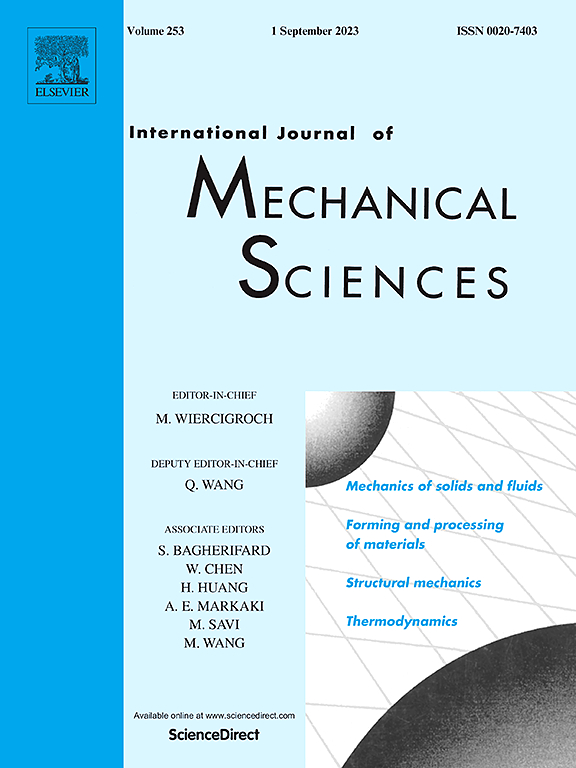Solitary-wave-based deep learning for compressive strength estimation in cementitious materials
IF 7.1
1区 工程技术
Q1 ENGINEERING, MECHANICAL
International Journal of Mechanical Sciences
Pub Date : 2025-03-20
DOI:10.1016/j.ijmecsci.2025.110170
引用次数: 0
Abstract
This study presents a novel deep learning (DL)-based approach for predicting the compressive strength of cementitious materials using highly nonlinear solitary waves (HNSWs) as input data. The proposed method leverages convolutional neural networks (CNNs) to classify compressive strength of mortar by transforming continuous measurements into discrete categories. Four different formats of HNSW signals are explored to evaluate the impact of signal preprocessing on model performance. Multiple mode testing is implemented to enhance the robustness of predictions, using multiple signals from the same class to reduce variability and stabilize results. The DL models were tested on datasets varying by water-to-cement (w/c) ratios and hydration time, achieving superior performance through signal slicing and frequency-domain transformations. Notably, the model achieved high prediction accuracy, with R² values up to 0.989 and RMSE as low as 0.930 MPa, demonstrating its reliability for predicting compressive strength in cementitious materials. Comparative analyses with benchmark architectures such as AlexNet, GoogleNet, and ResNet-18 highlight the effectiveness of the tailored CNN model, which consistently outperforms these benchmarks, especially in multiple mode testing.

基于孤立波深度学习的胶凝材料抗压强度估计
本研究提出了一种新的基于深度学习(DL)的方法,该方法使用高度非线性孤立波(hnsw)作为输入数据来预测胶凝材料的抗压强度。该方法利用卷积神经网络(cnn)将连续测量值转换为离散类别,对砂浆的抗压强度进行分类。探讨了四种不同格式的HNSW信号,以评估信号预处理对模型性能的影响。多模式测试是为了增强预测的鲁棒性,使用来自同一类别的多个信号来减少可变性并稳定结果。DL模型在不同水灰比(w/c)和水化时间的数据集上进行了测试,通过信号切片和频域变换获得了卓越的性能。值得注意的是,该模型预测精度较高,R²值可达0.989,RMSE值低至0.930 MPa,证明了该模型预测胶凝材料抗压强度的可靠性。与AlexNet、GoogleNet和ResNet-18等基准架构的比较分析突出了定制CNN模型的有效性,该模型始终优于这些基准测试,特别是在多模式测试中。
本文章由计算机程序翻译,如有差异,请以英文原文为准。
求助全文
约1分钟内获得全文
求助全文
来源期刊

International Journal of Mechanical Sciences
工程技术-工程:机械
CiteScore
12.80
自引率
17.80%
发文量
769
审稿时长
19 days
期刊介绍:
The International Journal of Mechanical Sciences (IJMS) serves as a global platform for the publication and dissemination of original research that contributes to a deeper scientific understanding of the fundamental disciplines within mechanical, civil, and material engineering.
The primary focus of IJMS is to showcase innovative and ground-breaking work that utilizes analytical and computational modeling techniques, such as Finite Element Method (FEM), Boundary Element Method (BEM), and mesh-free methods, among others. These modeling methods are applied to diverse fields including rigid-body mechanics (e.g., dynamics, vibration, stability), structural mechanics, metal forming, advanced materials (e.g., metals, composites, cellular, smart) behavior and applications, impact mechanics, strain localization, and other nonlinear effects (e.g., large deflections, plasticity, fracture).
Additionally, IJMS covers the realms of fluid mechanics (both external and internal flows), tribology, thermodynamics, and materials processing. These subjects collectively form the core of the journal's content.
In summary, IJMS provides a prestigious platform for researchers to present their original contributions, shedding light on analytical and computational modeling methods in various areas of mechanical engineering, as well as exploring the behavior and application of advanced materials, fluid mechanics, thermodynamics, and materials processing.
 求助内容:
求助内容: 应助结果提醒方式:
应助结果提醒方式:


